Homebrewers
Publisher: Greater Than Games
Format: Board Game
Number of Players: 2-5 Players
Play Time: Games Typically Run Less Than An Hour
Price: $35
Copy Provided By Publisher
December 2019 - Estimated Shipping Date
I'll be honest from the start: Homebrewers resonated wtih me as soon as I heard about it. Greater Than Games has a good track record of making fun games that our group likes, but the theme also hit me in just the right spot too. It wasn't just because the game involved beer, but because it involved the process of creating it. Would this be a game that would try to capture the frustration and creativity of creating your own recipes? I've made a few beers in the past, for better or worse, where long nights of effort go into trying something new, only to find out weeks later that it all came out wrong.
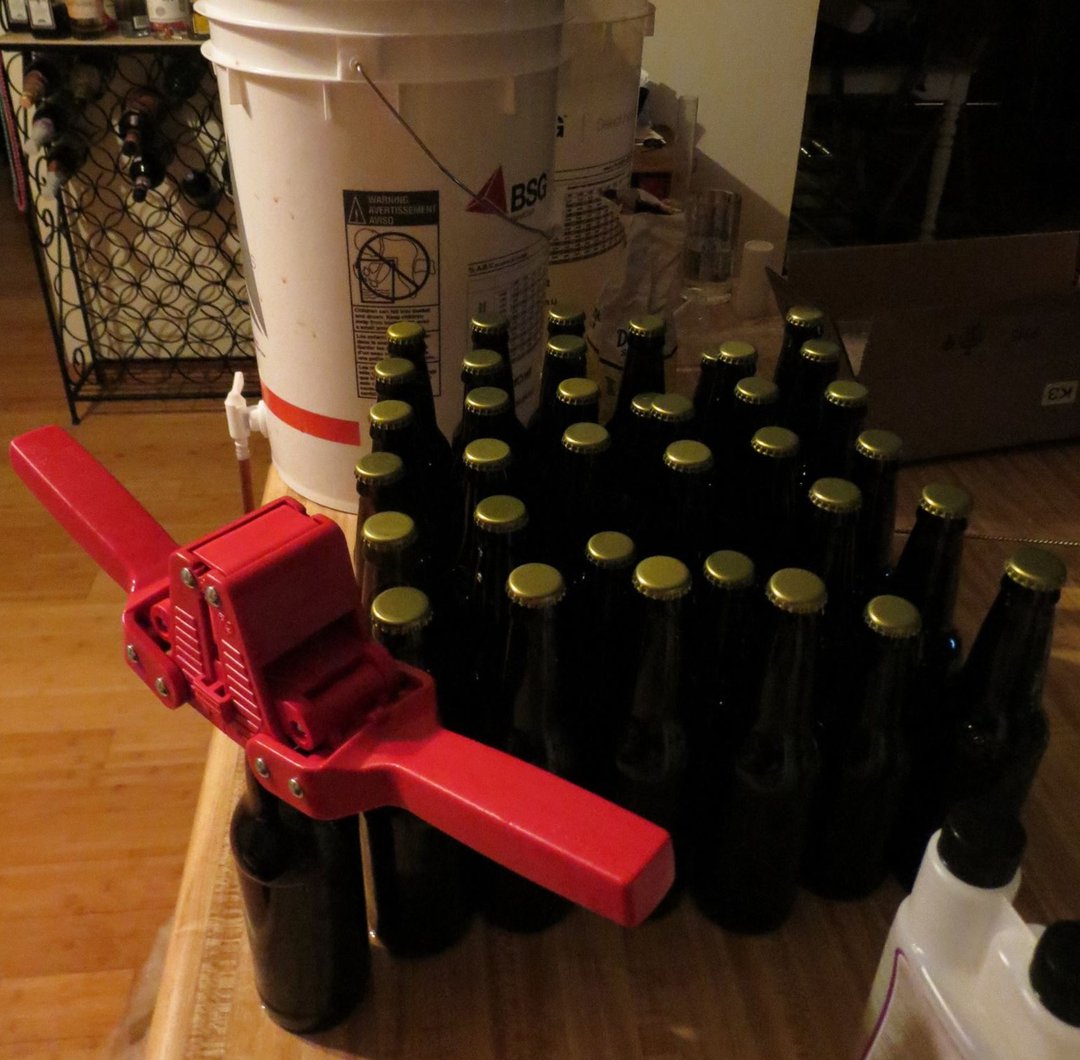
What two long nights of work, and three weeks of patience looks like.
Would this be a board game that made the process of brewing beer feel fun?
After playing nearly a dozen rounds over several weeks, I safely say that Homebrewers is a game that works hard to blend many styles of gameplay into a flavor of its own.
The Premise: Everyone Needs A Hobby
It was a stroke of chance that got me to try homebrewing for the first time. Years ago, while my bride-to-be's brother stayed with us for a while. As a grateful guest, he brought over a little project he had made with some friends, just to see if they could: a 11% stout that had both hot chili's and chocolate in it. It tasted good...amazing, even. Could I try to do the same?
Homebrewers is a game that is based around a local group of acquantances which all share the same passion of creativity and alcohol. Each player wants to make their own brew, but they also have a bit of friendly competition going on as well. Who can make batches of beer that will impress those in their community? Homebrewing associations are a real thing in many towns, including my own, and so this board game doubles down on the competitiveness that such a group can bring with it. The game doesn't capture the nitty-gritty details of making a drink from scratch - you don't spend time matching malts, yeasts, and hops - but it does capture the feeling of friendly rivalry; that feeling that each player is whipping up something new to share, to one-up others they respect.
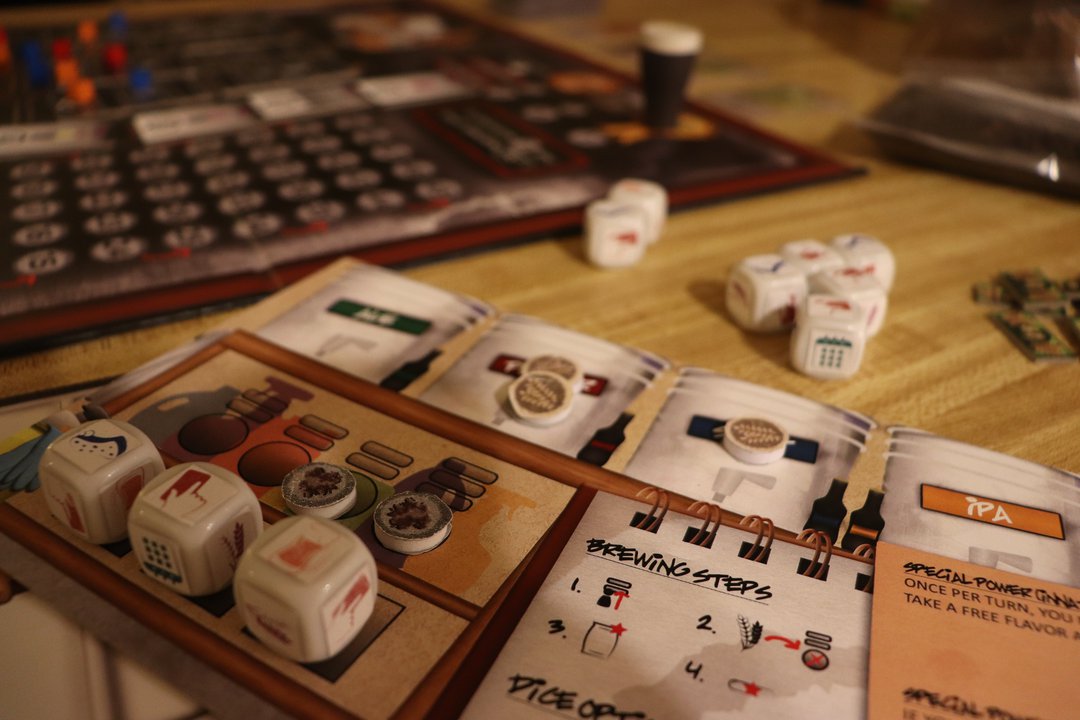
The player board: a place where you can keep track of what beers you can make, what actions you have stored up, and how clean your workspace is.
Homebrewers has a very simple format that makes a lot of sense: there are eight rounds, or 'months' in each game. In each month, you have a chance to roll three dice to determine what actions you might have during that round. These actions can be anything from finding more ingredients, taking time to sanitize your equipment, or actually doing the brewing. During the first half of the round, the game actually plays up the fact that this is a friendly competition, rather than a cut-throat business; you are allowed to trade dice with other players as your respective draughtmakers compare notes, or possibly swap materials at the monthly meet up. During the second half of the round, you fulfill the actions you have rolled or paid for using cash, and try your best to improve the quality of your drinks.
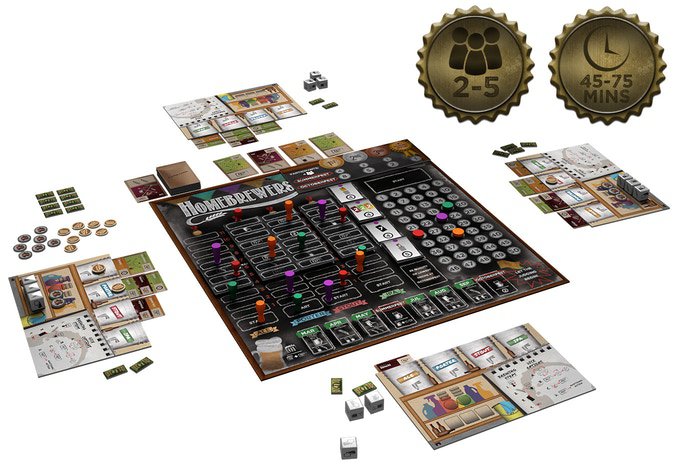
The rounds fly by quickly as each player attempts to have the best quality beer from four different catagories (Ale, Porter, Stout, and IPA), until you get to the fourth round: Summerfest. Here, the game slows down long enough to have a scoring session, to see how people are faring. You check to see who has the highest quality Ale, Porter, Stout, and IPA, and award them victory points according to their rank. Afterwards, you speed along to the final round, Octoberfest, which the points are tallied again for greater amounts. The judges weigh in with their own victory point requirements, and the totals to determine who is the best homebrewer among you!
The Basics: Finding Your Flavor Of The Month
It's a simple, effective formula, and its a bit surprising how fast it lets Homebrewers play, only slowing down when trade negotiations over action dice bogs down. It's a surprise because this is a euro game when you get down to its core. Don't worry, this game is not meant to suck you into hours of careful number-crunching and engine building, but Homebrewers does revolve around collecting abstract victory points and using your actions carefully to get an advantage.
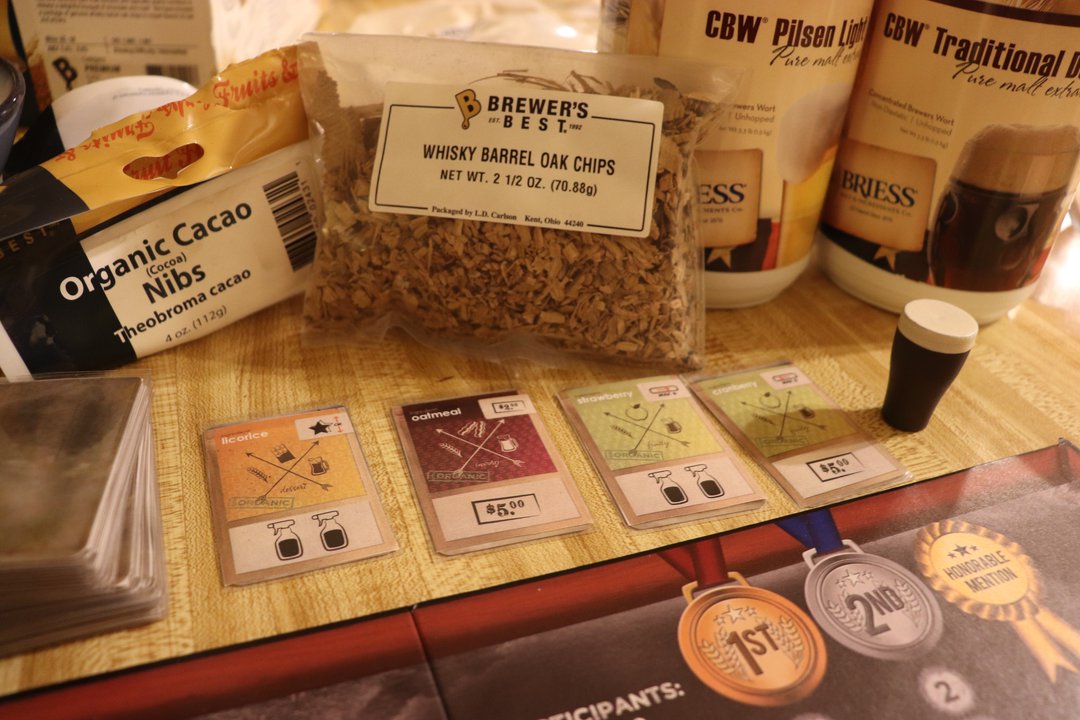
A look at the pool of various flavors in the game. Yes, I am taking pictures of this Kickstarter while brewing a stout - I felt inspired.
One way you can get that advantage is by taking a look at the flavor cards available to you. One of the dice actions you have is the ability to select flavors, or use ones you've already collected; owning the oatmeal flavor gives you the ability to use the card immediately to earn money... or you can slot oatmeal into one of the next brews you are making. While using a flavor immediately gives you a strong bonus, brewing with flavors also has benefits: each card is marked with a various ability, possibly raising the quality of another beer style, or just tacking on free victory points. The real trick however is that the judges at the end of the game are often looking for particular things: dessert beers with chocolate or coffee in them, or fruity summer beers with citrus. Knowing when to use flavor cards is critical to winning a game of Homebrewers.
Another thing to keep in mind is that the board state is constantly changing: the event action changes every month, and is revealed for that round. It might be easier to sanitize your equipment in April, for example, letting you improve your brewing quality. In May, you might think you are ahead because you own the highest quality stout and IPA, before you realize that another player is sneakily trying to win over the judges for extra points. Do you change tactics? Do you stop trading dice so freely, or do you just keep trying to make that oyster oatmeal stout that you are sure will net you a ton of points?
An Interesting Blend Of Style And Substance
Homebrewers has a lot going for it, and these positives come in many different forms. One that stands out immediately is the length of a game: after teaching the game to two friends, we were able to complete our second game in under an hour. Later games with three players were able to be done in 45 minutes, or even less. While you have plenty of options of what to do on your turn, being limited to only three actions (or four, if you use money or special abilities) a turn really keeps the game chugging along. For a game that prescribes to a euro mindset, that's a huge advantage; we're often unable to get games like Food Chain Magnate or Viticulture to our game day tables at the bar because of the sheer scope and size. In comparison, Homebrewers feels accessible, especially to the sort of people who swing by a casual public game night.
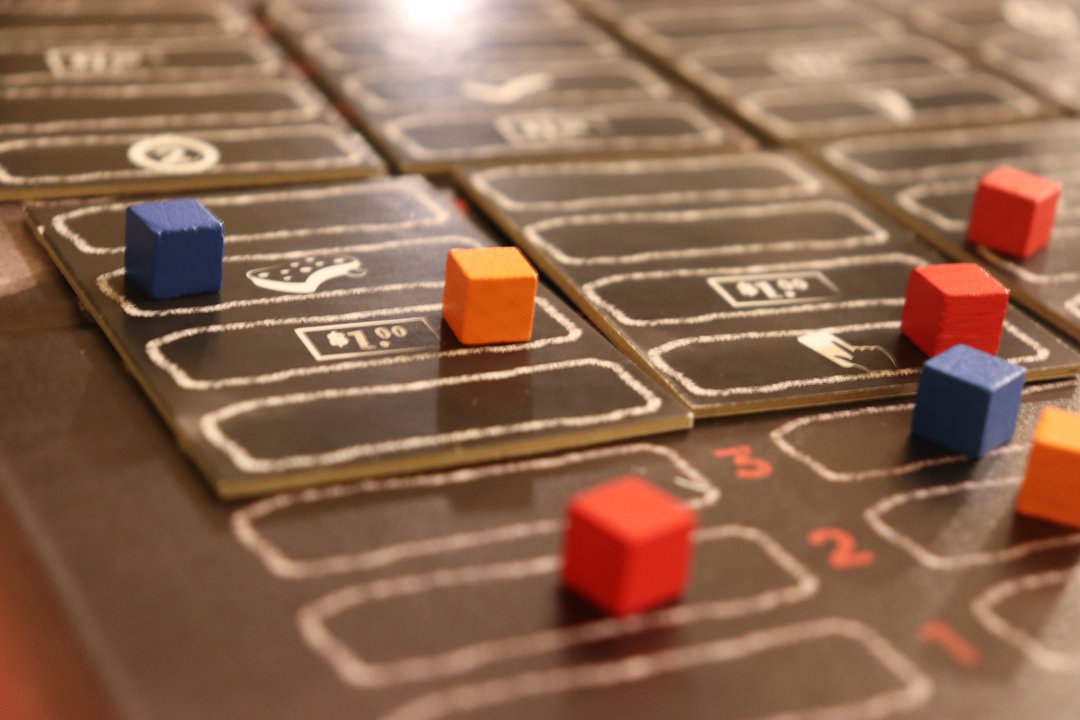
Customization is king - Homebrewers has components that lets you change the board every game.
The theme feels good while you play. Maybe its just the fact that I enjoy the topic, but the mood feels more casual than if Homebrewers had been listed as something like Beer Tycoons. Part of this certainly comes from the fact that you can trade dice during the first portion of each round; some of our characters (each player is given a character with a special ability) actually got benefits for successfully trading. Another portion of this feeling comes from the many customization options that come with the game: the individual beer quality tracks are adjustable to give different rewards each game for scaling them. The events and judges are randomized, and there are plenty of flavor cards to cycle through.
The game isn't perfect; there are some balancing issues between characters, but what we had is a prototype, with full production a year away. if there is one criticism I have to leverage, its that sometimes it is difficult to know which crowd Homebrewers is trying to please. This is by no means a straight forward euro game, but it has enough elements of one that it might turn off particular players. The theme comes through just fine, but its still abstract enough that some people might not become as invested as they could be. On the other side of things, people who love building engines and unstoppable combinations will love the idea of brewing incredibly high-point beers, but Homebrewers ends much faster than a heavy euro game, stifling that extreme as well. There's a trading mechanic like Settlers of Catan, but there isn't that sense of building up an empire.
Homebrewers is at its best as a hybrid of many other game styles, and does it well, but if you are looking for a 'standard' style of game, this is not it. It might be a great way to introduce a new board gamer to euros, but it won't satisfy everyone.
Does This Kickstarter Suit Your Tastes?
The most important question you can ask yourself while seriously taking a look at this Kickstarter campaign is this: do I have a place for this in my collection?
After playing Homebrewers a dozen times, I often found the biggest decider if it would be a hit was simply if the players enjoyed Euro style games. Those that who didn't enjoy these style games, shrugged, played a game, enjoyed that it was a crisp short experience, and walked away after. The players who enjoyed Euro games found themselves wanting to play another round immediately after; because games are so comparitively short, these players wanted another chance to optimize their strategy or try something new to become the next reigning champion of beer.
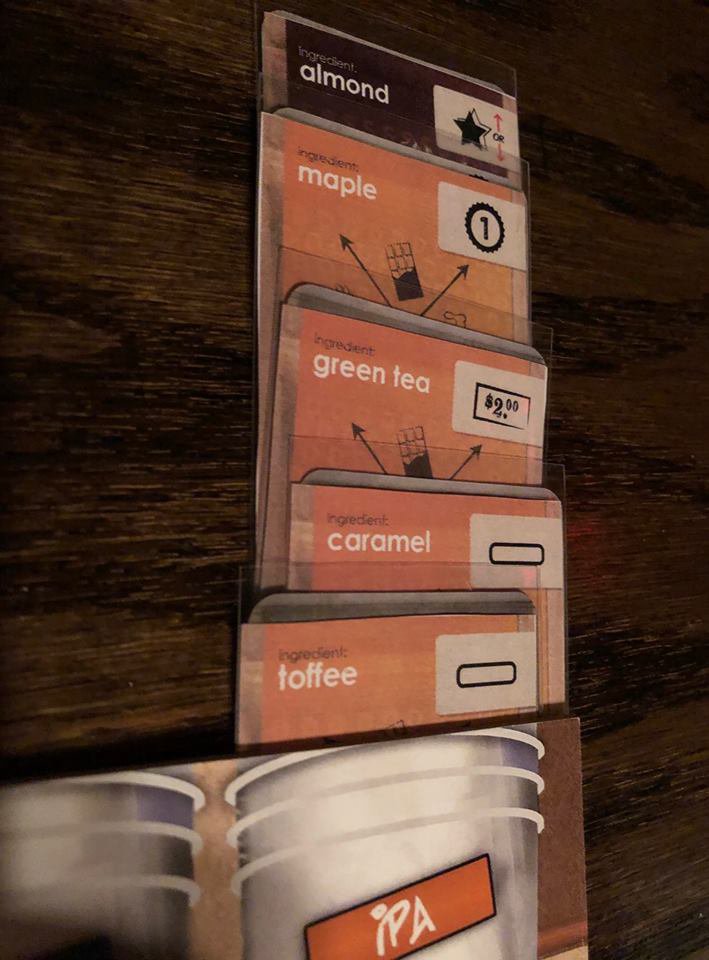
One of the most enjoyable experiences while playing this game is seeing what horrifying frankenstein beers you can make, and still get points for...
I'm glad I had a chance to cover this Kickstarter - I wouldn't have played so many games if I hadn't! The theme was enjoyable and accessible, and Greater Than Games usually gives enough twists to a standard formula to make their new games interesting. It doesn't cover the exact process you go through to make a homebrew, but that isn't the point here: accessibility and having a way to try out a Euro game without sacrificing a whole evening is. For only $35 dollars, this is a game that can fill a niche in your collection easily without breaking the bank. If you've wanted a Euro game on your shelf that's easy to share, I'd recommend Homebrewers quickly.
As of this article going up, there is only 48 hours left on the clock on the Kickstarter. Homebrewers is only $1,000 away from hitting their goal - I'm glad I've had a chance to try out this very interesting hybrid game, and I hope the campaign succeeds so others can too.